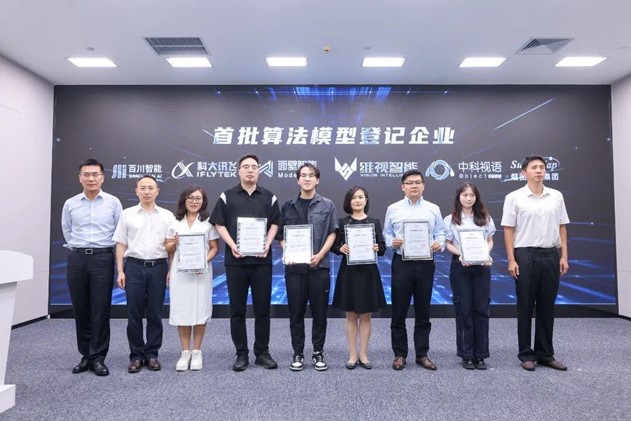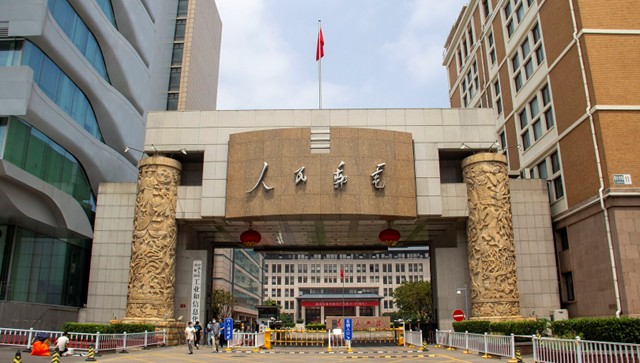
PRC Launches First Algorithm Registration Center, Strengthening AI and Data Regulation
PRC Launches First Algorithm Registration Center, Strengthening AI and Data Regulation
Executive Summary:
- The Beijing Algorithm Registration Center—also known as the Model Share Center—has opened as the PRC’s first physical algorithm registration center, marking a significant step in regulating AI development.
- The center is co-established by the local government, Zhongguancun Development Group, and Huawei through the Ascend AI Computing Center.
- Supported by the massive computing power of the Western Beijing AI Valley AI computing center, the algorithm registration center collaborates with the Beijing Municipal Intellectual Property Office and Beijing International Data Exchange, which was founded by a state-owned enterprise, to enforce the PRC’s latest data property measures.
- This initiative symbolizes the PRC’s growing state intervention in AI, with algorithm registration becoming a key regulatory tool, and reflects the PRC’s broader strategy to create a distinct data property rights system.
On 24 July 2024, the Beijing Algorithm Registration Center (北京算法登记服务中心)—also known in English as the “Model Share Center”—officially opened in the city’s Mentougou District (Mentougou District Government, July 26; People’s Daily Online, July 29; Model Share Center, accessed October 9). It is the first center of its kind in the People’s Republic of China (PRC), providing a physical space for algorithm model registration, transaction aggregation, technical support, and industry services. The center also offers guidance on filing registration documents for large language models (LLMs), handling intellectual property rights for algorithms and data, optimizing data registration services and data trading, setting up administrative services, and providing policy-related consultations and legal services.
New Center at Heart of ‘Western Beijing AI Valley’
The center, which is the largest AI computing center in the northern part of the PRC, is operated by the Beijing Ascend Artificial Intelligence Computing Center (北京昇腾人工智能计算中心). Co-founded by Huawei and local government entities, it uses Huawei’s Ascend AI hardware and software technologies (Beijing Municipal Science & Technology Commission, April 14, 2023). As the PRC’s first market-oriented AI computing service platform, it has been designed to provide inclusive and intelligent computing power (普惠算力), [1] entrepreneurial services, an innovation platform, and support for high-quality talent. The Algorithm Registration Center leverages the computing power of the “Western Beijing AI Valley (京西智谷)” Artificial Intelligence Computing Center, an AI computing center established by the same entities and located in the capital’s AI computing cluster, which caters to a wide range of entities working on AI applications (Mentougou District Government, April 17). [2] Built with infrastructure from the Beijing branch of state-owned telecoms firm China Unicom, the Western Beijing AI Valley center currently delivers 500 Petaflops (PFLOPS) of computing power. It is projected to reach 1000 PFLOPS by the end of the year (People’s Daily, January 16). [3] Collectively, Beijing’s computing centers now offer over 5000 PFLOPS of computing power (Beijing Information and Telecommunication Association, June 3).
Even before its official opening in April, the Western Beijing AI Valley had already launched an online algorithm registration service, set up a data assets service center, engaged with 45 related enterprises, and completed two data transactions (People’s Daily, July 29). The first batch of AI companies to register their algorithms at the center included Baichuan-AI, iFlytek, ModelBest, Vision Intelligence, Object Eye, and SuperMap.
Government Entities Integral to the Center’s Founding
Two government agencies have been involved in establishing the center. The first is the Beijing Municipal Intellectual Property Office, which integrated its existing registration platform with that of the center to allow it to handle the registration of intellectual property rights for algorithms (People’s Daily, July 29). Last year, it drafted the “Administrative Measures on Beijing Data Intellectual Property Rights Registration (北京市数据知识产权登记管理办法)” (Beijing Municipal Government, May 30, 2023). These measures regulate the ownership of unpublished data by constructing a citywide registration platform. The registration process includes submitting details such as the name of the dataset, its industry, application scenarios, data sources, data structure, update frequencies, algorithm rules, and data samples.
The second agency involved in establishing the center is the Beijing International Data Exchange, which will co-develop an “algorithm registration module” with the center. The exchange is the first such agency established in the PRC and operates on the principle that “data can be used but not be visible, usage can be controlled and measured (数据可用不可见,用途可控可计量)” (Xinhua, Mar 31, 2021).
The center’s origins come from an “opinion” released by the CCP Central Committee and the State Council on “Constructing a Basic System for Data that Better Gives Fully Play to Data as a Factor of Production (关于构建数据基础制度更好发挥数据要素作用的意见),” commonly referred to as the “Twenty Data Measures (数据二十条)” (Xinhua, December 19, 2022). This opinion recognizes data as a new factor of production and outlines the construction of a “basic system for data (数据基础制度).” As such, the measures supplant the previous framework of direct ownership of data, allowing third parties to purchase the rights to own, process, and operate data products. This separation of rights forms the core of a “data property rights system with Chinese characteristics (中国特色数据产权制度体系)” (National Reform and Development Commission [NDRC], December 20, 2022). One property of data is that the wider its circulation, the more it depreciates in value and, potentially, security. As such, the new basic system introduces a innovative approach to managing the “categorizing and grading (分类分级)” of data. The new center now reveals how the government will manage and protect these newly separated data rights in practice.
Conclusion
The construction of the Western Beijing AI Valley creates a discrete supply chain, connecting enterprises with the demand for AI models with developers by providing a trading platform for the former and computing power for the latter. Enabled by national legislation, local governments can now direct state-owned enterprises to build platforms for the industry as part of a “top-level design (顶层设计).” This approach creates new regulatory opportunities as the Algorithm Registration Center becomes operational (NDRC, December 20, 2022). Since AI relies on data, algorithms, and computing power, the center’s launch—backed by the regulatory framework—is a further indication of the centrality of state entities in the development of the PRC’s AI ecosystem.
Notes
[1] Inclusive and intelligent computing power (普惠算力) is a term used to describe the development of universally available and affordable computing power as a public infrastructure (KPMG China, July 2023).
[2] These fields include intelligent medical care, intelligent cities, intelligent manufacturing, intelligent parks, intelligent finance, AI super-scoring, automatic driving, intelligent remote sensing, intelligent travel, intelligent inspection, intelligent energy, intelligent robotics, and content auditing.
[3] The unit petaFLOPS (PFLOPS) represents one quadrillion calculations per second. In comparison, OpenAI used 3640PFLOPS per day when training its GPT3.5 model. A senior expert at Huawei has stated that they expect 7–8 similar data centers are needed to support applications like ChatGPT (The Paper, October 16, 2023).


